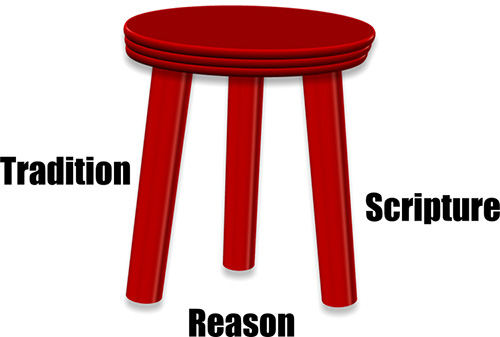
On the [day after] the anniversary of his death, it is worth reflecting how Richard Hooker (25 March 1554 – 2 November 1600) is regularly credited with Anglican theology sitting on a three-legged stool of Scripture, Tradition, and Reason. In his writings, the closest we can actually find to this is:
I do not know who coined the Anglican “Three-Legged Stool” – perhaps a reader here does. The image, however, is not Hooker’s.
The image of such a stool is useful: the legs can differ a bit in length, and the stool will still be stable. One can see, within Anglicanism, some people stress Scripture (Evangelicals), others Tradition (Catholics), and yet still others Reason (Liberals). Some people might add a fourth leg, Experience (Charismatics).
On the other hand, if the length of the legs differ significantly then the stool will be unstable – we need each of these, Scripture, Tradition, and Reason, even though there may be somewhat more stress on one than the other.
There is no question of the foundational place of the Scriptures. Some Anglican Churches can point to their current, binding book of common prayer as having about 2/3 of it directly drawn from the Scriptures.
As for Tradition, my understanding is that Hooker is clear that Tradition is not about some sort of ongoing revelation to and through the Church, but that Tradition (παραδοσις paradosis) is what is received and passed on (like the baton in a relay). Tradition is communicated in and through liturgy, architecture, ordained leadership, and through oral teaching and written documents. Tradition is expressed in the Scriptures. But after the close of the writing of the Scriptures, the creeds are part of the lens within Tradition complementing Scripture and Reason. Scripture, then, sits within the Church’s Tradition – in fact, without Tradition we do not even know which scroll is within what we now bind together within “one book” of “The Bible”. Eastern Orthodox might rightly focus on Tradition, seeing the Bible within Tradition.
Just as Tradition is not simply our tradition of biblical interpretation, so Reason is foundational not simply as reason about the Bible. Reason reveals, and the Bible itself is clear about that.
Hooker’s thoughts developed as he wrote – including a stronger stress on Reason and less enthusiasm for the more sola-scriptura, scripture-self-authenticating approach of Calvin. The presenting of Hooker as the creator of a Via Media between Roman Catholicism and Calvinism, however, is more anachronistic, more an Oxford-Movement lens on Hooker.
On the other hand, let’s not devalue Hooker’s place in the Via Media and the development of the Three-Legge-stool approach. Puritans opposed Hooker precisely because of his emphasis on Reason over against the Puritan sola-scriptura approach. And Seventeenth and Eighteenth century Anglican theologians built on and extended Hooker’s emphasis on Reason.



3-LEGGED STOOL is a timelessly interesting and useful image that conveys the idea that:
TRADITION is the road we have travelled as christians to arrive where we are today
REASON is the application of our God-given intelligence to ongoing developing understandings of creation as have been known along that road and are now known
SCRIPTURE carries the story of the insights of the travellers on that road over a period of possibly 2000 years, certainly up to 2000 years ago but not since.
THUS at every stage of travel along that road since late in the 1st century (60AD sh)
REASON must be brought to bear on interpretation of SCRIPTURE and applicability and usefulness of TRADITION in light of current cultural mores and developing understandings of creation.